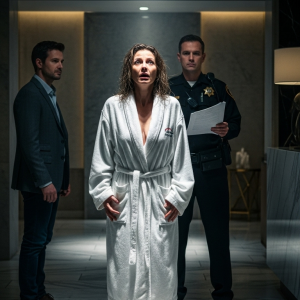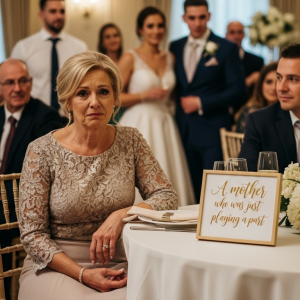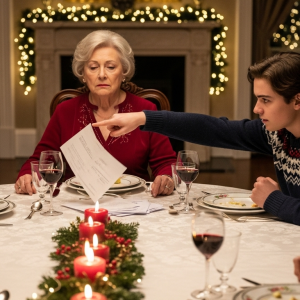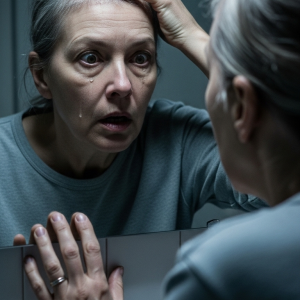I never imagined that losing my son would be the second worst thing to happen to me that week. Seven days after Carlton passed, I sat in the living room, folding his old sweaters. The scent of his cologne still lingered on the soft wool, a phantom of the man I had lost. Tears fell silently onto the fabric as I tried to hold on to every last memory.
“Naomi, we need to talk,” Cleo said, her voice sharp and devoid of the sympathy she’d shown at the funeral. She stood in the doorway, a vision of polished indifference in designer jeans and a silk blouse. Her perfectly manicured nails drummed against the doorframe, a sign of her impatience.
“Of course, honey, what is it?” I asked, looking up from Carlton’s favorite gray cardigan. He’d worn it just three weeks ago. Now, it was just a piece of fabric, and I was just a woman with a broken heart.
“I’ve been thinking about the house situation,” she began, and a cold dread settled in my stomach. “With Carlton gone, things need to change. The kids and I need space to grieve properly, and honestly, having you here is just too much right now.”
I blinked, trying to make sense of her words. “Too much? You’re always crying, always touching his things… It’s not healthy for the children to see their grandmother falling apart like this.” Her voice was steady, clinical almost. My hands trembled as I clutched the sweater. “Cleo, this is my home, too. Carlton wanted me to stay here, to help with the kids.”
She let out a short, humorless laugh. “Carlton said a lot of things when he was medicated and not thinking clearly. The reality is this house belongs to me now, and I need you to pack your things.”
The words hit me like a physical blow. The air left my lungs, and for a moment, the room seemed to tilt. “Don’t be dramatic, Naomi. You’re a grown woman. Make your arrangements and learn to manage on your own.” She paused, smoothing her hair. “You’ll figure something out. You always do.”
I thought about my small savings. It was barely enough for a security deposit, certainly not for rent in this expensive suburb. My voice trailed off as I saw her expression. “What about Emma and James? I watch them every day after school.”
“I’ll figure that out. Maybe it’s time they learned more independence anyway. Honestly, Carlton babied them too much, and so do you.” The casual cruelty in her tone made my chest ache. She was talking about her own children.
“How long do I have?” I managed to ask, my voice a whisper. “I’d like you gone by tomorrow evening. I have some people coming to look at redecorating Carlton’s office, and I don’t want any awkwardness.”
Twenty-four hours. That’s all the time I had to dismantle the life I’d built here. A life of love and sacrifice that was no longer her responsibility.
I packed my belongings that night. It was shocking how little I owned. Most of the furniture in my room belonged to the house, and I’d given away or donated most of my possessions over the years. I tucked Carlton’s gray cardigan into my suitcase, along with a framed photo of him with the kids. The hardest part was writing the note for Emma and James. How do you explain to an 8-year-old and a 10-year-old that their grandmother is leaving without making their mother look like a villain?
I kept it simple. Grandma Naomi had to move to a new place, but I love you both so much. Be good for mommy. Love and hugs always.
I left the note on their bathroom mirror, where they’d see it after I was already gone. I couldn’t bear to face their confused questions or see their tears. Cleo was right about one thing—they had already lost their father. They didn’t need to watch their grandmother fall apart, too. As dawn broke, I loaded my car with everything I had left and drove away, with nowhere to go and no idea how I would survive.
Two weeks. That’s how long a person can live in their car before the shame becomes unbearable. I’d parked behind a 24-hour diner, far enough from Carlton’s neighborhood to avoid being recognized. My daily routine was a careful dance of survival and dignity: a trip to the diner for a cheap cup of coffee and a piece of toast, using their restroom to wash my face and brush my teeth. The worst part wasn’t the physical discomfort; it was the invisibility. I had become a ghost of my former life. My neighbor Margaret, with whom I’d shared coffee dozens of times, looked right through me in the grocery store. I looked homeless because I was homeless. I had crossed an invisible line that separated the housed from the unhoused, and once you crossed it, people couldn’t see you anymore.
The lowest moment came when I drove by Carlton’s house. I saw a dumpster in the driveway, overflowing with furniture and belongings. I could see Carlton’s desk, his bookshelf, and the comfortable recliner where he used to watch movies with the children. Standing beside the dumpster, Cleo directed two men who were carrying out more furniture. She was on the phone, laughing, as they tossed Carlton’s things into the dumpster. My hands shook so hard I had to pull over. How could she erase him so completely, so quickly?
That evening, I made the mistake of checking Facebook. Cleo had posted a photo of her completely redecorated living room. The caption read, “Sometimes you have to clear out the old to make room for the new, feeling grateful for fresh starts and new beginnings.” The comments praised her strength, her courage. Someone had even written, “Carlton would be so proud of how well you’re handling everything.” Huddled in my car that night, I let myself cry, not the silent tears I’d been leaking for weeks, but deep, wrenching sobs. I cried for the life I’d lost, for the grandchildren I might never see again, and for the woman I used to be. But mostly, I cried because I was starting to believe what Cleo’s actions had told me all along: that I was disposable.
I woke up to the sound of my phone ringing, an unknown number on the cracked screen. Lately, unknown numbers meant bills I couldn’t pay or problems I couldn’t solve. But something made me answer.
“Mrs. Peterson, this is Robert Chen from Chen, Martinez, and Associates. I was your son, Carlton’s attorney. We need to discuss some urgent matters regarding Carlton’s estate.”
My heart started racing. “Estate? Cleo handles all of Carlton’s affairs now.”
“Mrs. Peterson, there are specific provisions in your son’s will that concern you directly. Provisions that Mrs. Peterson, Cleo, is not aware of. I really need to speak with you in person.”
Something in his tone made my pulse quicken. “Can you tell me what this is about?”
“Not over the phone. Can you be here at 10 a.m.?”
I looked down at my wrinkled clothes, ran a hand through my unwashed hair. “Mr. Chen, I should probably mention that I’m… I’m going through a difficult time right now. I might not look very presentable.”
“Mrs. Peterson,” his voice was gentle but firm. “Please come as you are. This cannot wait any longer.”
Three hours later, I sat in the most luxurious office I’d ever been in, feeling completely out of place. Robert Chen, a distinguished man in his 50s with kind eyes behind wire-rimmed glasses, offered me coffee. It was the first decent cup I’d had in weeks. “What is your current living situation?” he asked. The question caught me off guard, and I felt heat rise to my cheeks. “I’m staying in my car.”
He made a note, and I expected judgment, but his face showed only compassion. “Carlton was a very intuitive man. He anticipated this might happen.” He pulled out a thick manila folder. “Mrs. Peterson, Carlton came to see me eight months ago, shortly after his cancer diagnosis. He was very specific about changes he wanted to make to his will. Changes he asked me to keep completely confidential until after his death.”
He opened a document and began to read: “To my beloved mother, Naomi Peterson, who sacrificed so much for my happiness and well-being, I leave the sum of 7 million dollars, to be held in trust and managed by Chen, Martinez, and Associates until such time as Mrs. Peterson can establish stable housing and financial management.”
I stared at him, certain I had misheard. “$7 million?”
“Mrs. Peterson, your son was far wealthier than most people knew. He’d been making extremely successful investments for years.”
My mind reeled. “But Cleo said… she said everything belonged to her now.”
“There’s more to the will that you need to hear,” he said, flipping a page. “In the event that my wife, Cleo Peterson, attempts to remove my mother from the family home or otherwise cut off contact between my mother and my children, full custody of Emma Peterson and James Peterson shall immediately transfer to my mother, Naomi Peterson, with all necessary financial support included.”
My coffee mug slipped from my numb fingers. He quickly moved to catch it. “Custody? But how is that possible?”
“Carlton filed all the necessary paperwork months ago. He documented several concerning behaviors he’d observed in Cleo. He was very concerned about his children’s welfare.”
He handed me a letter. “Carlton also set up recordings of several conversations with Cleo during his final weeks. He was very concerned about his children’s welfare.” My hands shook so badly I couldn’t hold the paper. “Could you read it, please?” I asked.
He unfolded the sheet covered in Carlton’s familiar handwriting. “Mom, if you’re hearing this, it means my worst fears about Cleo have come true… I know she probably told you that you’re not wanted, that you’re a burden. She’s wrong. You are the most loving, selfless person I’ve ever known… The money I’m leaving you isn’t just an inheritance. It’s payment for all the years you put our needs before your own. It’s also my way of making sure you have the power to protect Emma and James, the way you always protected me.”
By the time Mr. Chen finished reading, tears streamed down my face. Not tears of grief, but of relief, vindication, and a growing sense of power I hadn’t felt in weeks. “When can we proceed with the custody transfer?” I asked, my voice steadier than it had been in days.
“We can file the paperwork this afternoon. But first, let’s get you out of that car and into a hotel.”
Three days later, I stood in front of the house that had been my home for five years. But this time, everything was different. This time, I held legal documents that changed everything. Mr. Chen had insisted on accompanying me, along with a social worker and a police officer. It was standard procedure for custody transfers, he explained. I was wearing new clothes, my hair styled, and the biggest change was the way I carried myself—a quiet confidence that came from knowing I wasn’t powerless anymore.
I pressed the doorbell. Through the frosted glass, I could see Cleo’s figure approaching. She was probably expecting a delivery or a friend. The door swung open, and her expression went through several rapid changes: confusion, recognition, annoyance, and finally, panic as she noticed the official entourage behind me.
“Naomi, what is this? What are you doing here?” she demanded.
Mr. Chen stepped forward. “Mrs. Peterson, I’m Robert Chen, Carlton’s attorney. We need to discuss some important legal matters concerning your children. May we come in?”
“I don’t understand,” Cleo stammered. “Naomi, why are there police here? Are you in some kind of trouble?” The irony wasn’t lost on me. Even now, her first assumption was that I was the problem.
We stepped inside, into the sterile, expensive, and completely impersonal living room. “Where are Emma and James?” the social worker asked.
“They’re at school,” Cleo said, her voice rising. “Wait, what did you mean by custody transfer? What is this about?”
Mr. Chen opened his briefcase. “Mrs. Peterson, I need to inform you of certain provisions in your late husband’s will that are now taking effect.” As he read the relevant sections, I watched Cleo’s polished mask begin to crack, revealing something raw and desperate underneath. “That’s impossible!” she interrupted. “Carlton never said anything about this. You’re lying!”
“I have all the original documents here, Mrs. Peterson, including audio recordings of conversations between you and Carlton where these concerns were discussed.” He pressed play, and Carlton’s voice filled the room.
The recording was a conversation where Cleo casually discussed her plans to move to California and how she viewed me as a burden. The casual cruelty in her voice was devastating, even to me, who had lived it. When the recording stopped, the silence was deafening.
“How dare you come into my home with these people and try to take my children?” Cleo shrieked, turning her fury on me.
“They’re not just your children,” I said quietly, speaking for the first time. “They’re Carlton’s children, too. And according to his will, they’re now my responsibility.”
“You can’t do this! I’ll fight it! You’re homeless! You have no job, no money!”
Mr. Chen cleared his throat. “Mrs. Peterson, I should inform you that Mrs. Naomi Peterson is now the beneficiary of a $7 million inheritance from Carlton’s estate. Her housing and financial situation have been completely resolved.”
The number hit Cleo like a physical blow. She actually stumbled backward, her face going white. “Seven million? But the life insurance was only two million!”
“Carlton had significant investments and assets beyond the life insurance policy,” Mr. Chen explained patiently. “Assets that he chose to leave to his mother, along with custody of his children.”
I watched Cleo’s mind race. The exact moment the reality hit her was when she realized she had lost not only the children, but access to the money she’d been counting on. “This isn’t fair!” she cried. “I’m their mother! I’ve taken care of them for years!”
“Have you?” I asked, my voice growing stronger. “When was the last time you helped Emma with her nightmares about losing her daddy? When did you last sit with James while he cried because he missed his father’s bedtime stories?”
Cleo’s mouth opened and closed, but no words came out. “You were redecorating. You were planning your fresh start. You were throwing away their father’s belongings and telling them not to be dramatic when they asked questions.” The social worker looked up from her notes. “Mrs. Peterson, we’ll need to collect the children from school today.”
When I saw Emma waiting outside her classroom, her first words broke my heart. “Are you real or am I dreaming again?”
I knelt down. “I’m real, sweetheart, and I’m here to take you and James home.”
“But Mommy said you went away because you didn’t want to live with us anymore.” Her voice was so small, so careful, as if the wrong words might make me disappear again.
“Your mommy was wrong, Emma. I never wanted to leave you. I love you and James more than anything in the world.”
James appeared from his classroom, his 10-year-old swagger faltering. “Mom said you were mad at us.”
“James, Emma, I need you both to listen to me very carefully,” I said, sitting on the hallway floor. “I didn’t leave because I was mad at you. I left because your mother asked me to leave. But you’re right. Grandmas aren’t supposed to leave, and I’m never leaving you again.”
We drove to our temporary housing, a modest but comfortable three-bedroom apartment. The children were quiet, processing the massive change. It wasn’t the showcase home they were used to, but it felt warm in a way that house hadn’t for months. That first evening, we ordered pizza and sat on the living room floor. I told them stories about their father as a little boy, stories they’d never heard before, and watched them laugh for the first time in weeks.
Over the next few weeks, I watched Emma and James slowly come back to life. They were no longer walking on eggshells, afraid to make a mess or be too loud. They started asking questions about their father, real questions about his childhood, his fears, his dreams.
One rainy Saturday afternoon, Emma found me crying quietly in the kitchen. “Grandma Naomi, are you sad because of Daddy?”
“Yes, sweetheart. I miss him very much.”
“Mommy said I shouldn’t cry about daddy because it makes other people sad, too.”
“Oh, Emma.” I pulled her into a hug. “It’s okay to cry when you miss someone you love. Crying doesn’t make me sad. It makes me proud that you loved your daddy so much.”
“Can I cry with you sometimes?”
“Always, sweetheart. We can cry together, and we can laugh together, and we can remember daddy together.”
That afternoon, all three of us ended up on the couch, sharing memories and tears. For the first time since Carlton’s death, his children were allowed to grieve properly, to feel their emotions without worrying about how it affected the adults around them. I realized that Carlton had given me more than money and legal authority. He had given me the chance to give his children what they needed most: permission to be human, to feel deeply, to love without fear. And in doing so, he had saved not just them, but me as well.
Six months later, I stood in the kitchen of our new home, a three-bedroom house with a backyard where Emma could do cartwheels and James could throw his baseball against the fence. The house was a testament to our new life: messy, loud, and full of unconditional love.
The doorbell rang, and my stomach tightened with old anxiety. I opened the door to see Cleo, looking more uncertain than I had ever seen her. The past six months hadn’t been kind to her. “Hello, Naomi,” she said, holding a small gift bag. “I was hoping I could see the children for a few minutes.”
I studied her face, looking for the manipulation that had once come so naturally to her. Instead, I saw a genuine humility I’d never seen before. “The children are doing homework, but you can come in for a few minutes.”
She followed me into the living room, where James looked up from his math problems with a polite but guarded expression. “Hi, Mom.”
“Hi, sweetheart. How’s school?” she asked.
“Good. I made the honor roll again.” His voice was matter-of-fact, neither seeking her approval nor rejecting her interest.
“That’s wonderful, James. Your father would be so proud.” Something in her tone was different, softer.
“I brought you an early birthday present,” Cleo said to Emma, holding out the gift bag. Inside was a small silver locket with a picture of Carlton. “I thought you might like to wear it sometimes.”
After the children went back to their homework, Cleo and I stood in the kitchen. “They look happy,” she said.
“They are happy. They’re allowed to be sad sometimes, too, which is equally important.”
“I wanted to apologize, Naomi, for how I treated you. For the things I said.”
“What changed?” I asked.
“Losing them,” she said simply. “Losing the children made me realize that I’d been losing them already, bit by bit, by trying to control everything instead of just loving them. And seeing how much they’ve thrived with you made me understand that Carlton was right. He knew what they needed, and he knew I wasn’t ready to give it to them.”
It was the closest thing to an apology I’d ever heard from her. “They still need their mother,” I said carefully. “Just not the mother you were trying to be. They need you to be real with them, to admit when you make mistakes.”
“I don’t know how to do that,” she confessed.
“Carlton struggled, too, especially at the end,” I said. “But he let the children see that it was okay to be scared, okay to be sad, okay to need help. That’s what made him such a good father.”
“You’re a good grandmother, Naomi,” she said quietly. “Better than I ever gave you credit for.”
“I love them. That’s all I’ve ever done.”
“No, it’s more than that. You listen to them. You see who they really are instead of trying to make them into who you think they should be.”
She asked to schedule an extra visit for Emma’s birthday. I considered the request. The woman standing in front of me wasn’t the same person who had thrown away Carlton’s belongings. She was trying. “One hour,” I said. “And they call me when you pick them up and when you drop them off.”
After she left, James looked up from his homework. “Grandma Naomi, do you think Mom is getting better?”
“I think she’s trying to get better,” I said honestly. “What do you think?”
“She seemed sadder, but nicer,” he said thoughtfully. “Like maybe she misses Dad the way we do now.”
That evening, I sat on the back porch with a cup of tea. Six months ago, I had been sleeping in my car, convinced that I was unwanted and unnecessary. Tonight, I was the legal guardian of two thriving children, living in a comfortable home, and I finally understood the true gift Carlton had given me. It wasn’t just money or a house; it was purpose. He had saved us all: his children from a life of emotional neglect, and me from the despair of believing I was disposable.
The next morning, I was in the kitchen making pancakes, Carlton’s recipe. “Grandma Naomi,” Emma said, climbing onto her stool. “I had a dream about Daddy last night.”
“Was it a good dream or a sad dream?”
“Good. He was making pancakes just like you are, and he told me he was happy that you’re taking care of us.”
I felt tears prick my eyes, but I didn’t try to hide them. “I’m happy to take care of you, too, sweetheart. It’s the best job I’ve ever had.” As we sat around the breakfast table, a mess of syrup and orange juice, I realized that this was what Carlton had been fighting for in his final months. Not just his children’s financial security, but their right to live in a home where love was more important than perfection, where grief was allowed to coexist with joy, and where being human was not just tolerated but celebrated.




